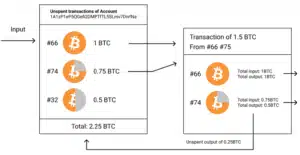What is cryptocurrency mining?

Cryptocurrency mining is the process of validating blockchain transactions for a particular cryptocoin. Specialized computers, also known as nodes or mining rigs, validate the Digital Payments in exchange for a mining payout. To receive a block reward, miners compete to demonstrate their computing talent.
Nodes, Rigs, and Pools
Blockchains need a vast network of machines to validate and record transactions to assist the globally distributed digital ledgers of cryptocurrencies.
- A computer system that runs the Bitcoin software program and keeps a proper record of the network’s transaction log is referred to as a
- A mining rig is a piece of equipment that adds new coins to the cryptocurrency’s current circulating supply.
- Pools are groups of miners who share their computational resources.
A collection of independent miners can pool their processing power, known as hash rates, through a fleet of nodes or a pool to obtain block rewards and divide the payouts among themselves.
Consensus Building Through Proof-of-Work (PoW)
Blockchains need a methodology for attaining decentralized consensus to confirm the validity of new blocks, and this consensus process in cryptocurrency mining is called proof-of-work (PoW). In exchange for their computational support in verifying transactions, miners are rewarded with a fixed quantity of the coin.
How to begin cryptocurrency mining (For Beginners)
A mining setup requires specialized hardware, which must be purchased upfront, as well as continuing operating costs like energy. However, it gives miners the most control and earning possibilities. Anyone interested in mining cryptocurrencies can either own and manage their mining rig or use cloud mining, which involves buying hash rates from a third-party machine. In contrast, cloud mining does not call for a down payment and gives miners the freedom to invest what they can. Both scenarios require bitcoin mining software (e.g., bitcoin trading software) for new miners to participate.
Is mining profitable?
Individual miners’ profitability margins tend to be small. Over the past ten years, as more and more individual miners and business mining firms entered the market, making money from crypto mining has grown increasingly challenging. The cost depends on the mining equipment and the area. The price of the necessary electricity can be even more expensive depending on the area, and the cost of the hardware might range from tens to hundreds of thousands of dollars.
The first widely used cryptocurrency, Bitcoin, gave its first miner 50 BTC, worth $6,000, in 2009. At the time, mining a single Bitcoin required significantly less computer power and energy, allowing interested miners to take home the majority of the reward. There are a lot of factors involved in bitcoin mining. Due to this, purchasing bitcoin on an exchange may be a more convenient approach to turning a profit. However, mining bitcoin can be more profitable when done effectively than simply buying and “holding” it (a term used to describe the act of not selling your bitcoin). Naturally, the price of bitcoin affects every miner. But three things set lucrative miners apart from everyone else: inexpensive electricity, affordable and effective hardware, and a competent mining pool.
Most popular cryptocurrency mining apps
Cryptocurrency mining apps are divided into two categories namely commercial and open source.
Some best commercial cryptocurrency mining apps
- Cudo Miner – is a premium option offering miner, mining, and cloud mining solutions which is compatible with Windows, macOS, Linux, CudoOS, and ASICs.
- Ethermine – For long-term investors, ethermine offers instant rewards and better security. To get started, miners can select an AMD or NVIDIA CPU, mining software for Windows or Linux, and a geographic mining server (Asia, Europe, North America).
- Awesome Miner – it includes several choices for cloud mining (Managed Miner), ASIC firmware, mining pools, and connecting an external ASIC rig. Awesome miner has everything a beginner miner could need to get started and turn investment to profit.
Some best open-source cryptocurrency mining apps
- Multiminer – Beginner and inexperienced miners who are not familiar with the underlying technical mechanisms at work should use MultiMiner. The administrator has the option to choose features like load balancing, mining the most lucrative cryptocurrency, and adjusting mining regulations.
CGMiner – programming language C was also used to create the free and open-source ASIC crypto mining program CGMiner, which runs on Windows, macOS, and Linux platforms.






